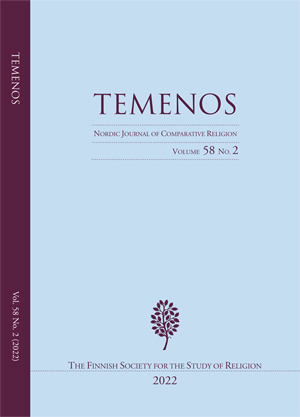Islamic Family Law(s) in Finland
Reflections on Freedom of Religion from the Wellbeing Perspective
DOI:
https://doi.org/10.33356/temenos.113886Keywords:
Islamic family law, Finland, Wellbeing, Freedom of religion, Legal pluralismAbstract
A central premise of the concept of freedom of religion is that the state has the obligation and authority to regulate and protect the religious rights of individuals and religious communities. However, this entails the state’s navigation of the rights of citizens vis-à-vis the norms of their religious communities, which in some cases may be in tension. The state must also maintain the country’s central legal principles. These premises are interconnected in vexing ways. This article studies how the concept of freedom of religion, with these underlying premises, applies to the practice of Islamic law in Finland. This question is reflected through an analysis of Finnish Muslims' marriage practices.
We argue for a nuanced understanding of the relationship between Islamic family law and freedom of religion. Towards this goal we employ the concept of wellbeing (building on Sarah White 2010) to locate the practice of Islamic family law in Finnish Muslims’ daily lives, whereby they pursue material, relational, and ethical needs and aspirations. We analyse how individuals conclude their marriages and the diverse motivations and meanings underlying these practices. Our aim is to capture the familial, economic, racial, political, and ethical processes through which Finnish Muslims continually and dynamically organize marriage (and divorce) and the implications for their freedom of religion on the one hand and for the Finnish state on the other. Our analysis draws on interview data collected in an ethnographic study of Muslim marriage and divorce practices in Finland in the period between 2013 and 2018.

Downloads
Published
Versions
- 2022-12-22 (2)
- 2022-12-22 (1)
How to Cite
Issue
Section
License
Copyright (c) 2022 Mulki Al-Sharmani, Sanna Mustasaari

This work is licensed under a Creative Commons Attribution 4.0 International License.
Author's Guarantee
- The Author acknowledges that the Work will be publicly accessible on the Internet and that such access will be free of charge for the readers.
- The Author guarantees that the Work is her/his original work that has not been published before and cannot be construed as copying or plagiarism. Furthermore, the Author confirms that the Work contains no statement that is unlawful, defamatory or abusive or in any way infringes the rights of others.
- The Author confirms that she/he has secured all written permissions needed for the reproduction in the Publication of any material created by a third party.
User Rights
Under the CC BY 4.0 license, the Author/s and users are free to:
- Share — copy and redistribute the material in any medium or format,
- Adapt — remix, transform, and build upon the material for any purpose, even commercially,
- However, the Work must be attributed to the original Author and source of publication.
The license of the published metadata is Creative Commons CCO 1.0 Universal (CC0 1.0)
Author Rights
The Authors maintain the right to:
- copyright, and other proprietary rights relating to the Work,
- the right to use the substance of the Work in future own works,
- the right to self-archiving/parallel publishing (publisher's PDF allowed).
Rights of Publisher
- The Publisher reserves the right to make such editorial changes as may be necessary to make the Work suitable for publication in the publication, e.g. style of punctuation, spelling, headings and the like.
- The Publisher will publish the Work if the editorial process is successfully completed and reserves the right not to proceed with publication for whatever reason.
- The publication entitles the author to no royalties or other fees. This agreement will be governed by the laws of Finland.






